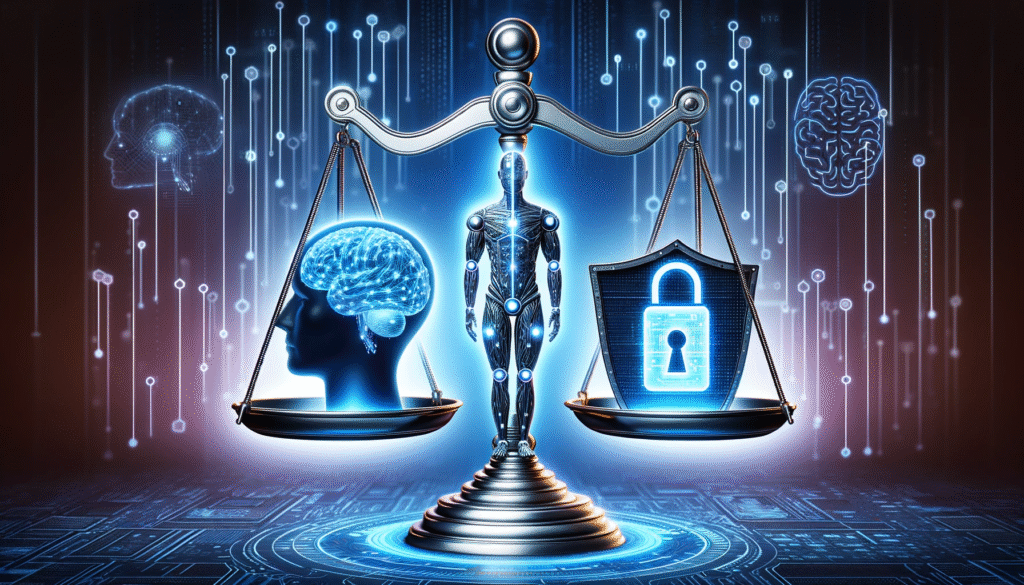Introduction: The AI Privacy Paradox
Artificial Intelligence has revolutionized how we work, create, and communicate – but at what cost? While AI tools like ChatGPT, facial recognition, and personalized ads offer incredible convenience, they also collect, analyze, and sometimes misuse our personal data in ways most users don’t realize.
This 1,000+ word investigation reveals:
✔ How AI secretly collects your data
✔ Shocking cases of AI privacy breaches
✔ Which popular tools are highest-risk
✔ How to protect yourself
Let’s pull back the curtain on AI’s hidden dangers.
1. How

A. Data Collection: What AI Really Knows About You
Most AI systems require massive data to function. They collect:
- Everything you type (prompts, searches, messages)
- Location data (from mobile apps and browsers)
- Biometrics (voiceprints, facial recognition scans)
- Behavioral patterns (how long you linger on content)
Example: ChatGPT stores all conversations by default to “improve its services” – meaning your private queries could be reviewed by trainers.
B. The Hidden Dangers of “Free” AI Services
Free AI tools often monetize through data harvesting. Notable offenders:
| Tool | Privacy Risk |
|---|---|
| ChatGPT | Stores conversation history indefinitely |
| Google Bard | Links to your Google account & location |
| FaceApp | Claims perpetual rights to user photos |
| Clearview AI | Scrapes social media photos illegally |
2.

Case Study 1:

- What happened: Amazon employees listened to private Alexa recordings, including intimate moments and financial discussions.
- Outcome: Over 1,700 voice clips were leaked to the public.
Case Study 2:

- What happened: Zoom patented AI that analyzes user facial expressions to detect emotions during calls.
- Outcome: Major backlash forced Zoom to pause development, but the tech still exists.
Case Study 3: Stable Diffusion’s Copyright Violations
- What happened: The AI art generator was trained on stolen artwork from living artists without consent.
- Outcome: Ongoing lawsuits may reshape AI copyright laws.
3.

(2024)
1.

(Clearview, PimEyes)
- Risk level: 🔴 Extreme
- Why? Scans billions of online photos without consent. Used by law enforcement to track civilians.
2.

(ChatGPT, Bard)
- Risk level: 🟠 High
- Why? Training data includes private conversations. Leaks could expose sensitive info.
3.

- Risk level: 🟠 High
- Why? Just 3 seconds of audio can clone your voice for deepfakes.
4.

(Ada, Woebot)
- Risk level: 🟡 Moderate
- Why? HIPAA loopholes allow mental health data to be sold to advertisers.
5.

(Superhuman, Lavender)
- Risk level: 🟡 Moderate
- Why? Reads your emails to “optimize responses” – including confidential info.
4. How AI Data Gets Hacked or Misused

A. Training Data Leaks
- Example: In 2023, ChatGPT’s training data was found to include private medical records and credit card details.
B. Third-Party Sharing
- Example: 72% of free AI apps sell data to advertisers (Per Princeton study).
C. Government Surveillance
- Example: China’s social credit system uses AI face tracking to punish “untrustworthy” citizens.
5.

Step 1: Adjust AI Tool Settings
- ChatGPT: Disable “Chat History” in settings.
- Google Bard: Use a burner account, disable location.
- Windows 11: Turn off “Recall AI” screen recording.
Step 2: Use Privacy-Focused Alternatives
| Risky Tool | Private Alternative |
|---|---|
| ChatGPT | Local LLMs (Ollama) |
| Google Bard | DuckDuckGo AI Chat |
| FaceApp | Offline photo editors |
Step 3: Browser Protections
- Install uBlock Origin (blocks trackers)
- Use Brave Search (no AI profiling)
- Enable Firefox Total Cookie Protection
Step 4: Legal Rights (GDPR & CCPA)
- Request data deletion from AI companies
- Opt out of AI training (available in EU)
6.

Upcoming Threats:
- Emotion-detecting AI in job interviews
- AI “digital twins” that mimic your personality
- Brainwave-reading wearables (Neuralink risks)
Positive Developments:
- EU AI Act (bans facial recognition in public)
- Apple Intelligence (on-device AI processing)
Conclusion: Should You Stop Using AI?
Not necessarily—but use it wisely. Follow these rules:
- Never share sensitive info with AI chatbots
- Pay for premium tools (free versions sell data)
- Assume everything is recorded

Leave a Reply